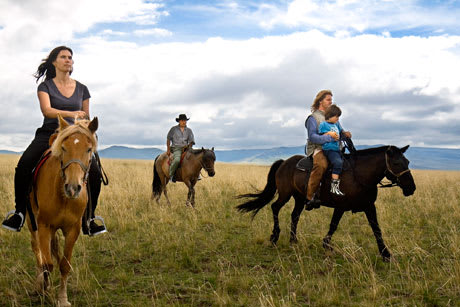When we meet seven-year-old Rowan, he can't talk, use a toilet or interact very well. He requires a witch's brew of supplements and prescription drugs to maintain this status quo. But like all autistic people, he possesses extraordinary gifts. The moment his equine-loving father sets him on a horse, there is an immediate, nearly supernatural bond.
This father, an expert on Mongolian shamanism, hatches a brazen plan to take his child, who screams bloody murder on a simple trip to the grocery store, on a cross-Mongolian horseback trek to visit healers. In Mongolia, shamanism isn't some new age goofiness ex-ravers embrace in the great comedown of middle age; it's the preferred method of healthcare, conflict resolution and government. If you believe natural forces can be tapped into, these are the practitioners to visit.
The parents endure gruelling rituals and express concern that their child is destined for some kind of home, while the cinematography astonishes. I won't spoil the dramatic climax but scientifically minded/blinded sceptics will grimace at the apparent results.
The narrative is filled out with commentary from autism experts. One reveals that shamans in every isolated culture that's been studied had neurological abnormalities, many similar to autism. Recent studies and opinion reflect that autistic folk don't need to be "fixed" but have special gifts the world must benefit from.
As noted autistic Dr. Temple Grandin says, "We wouldn't have power to light this room or film to put in that camera if it weren't for autistic people." Rowan's parents opened an equine retreat for autistic children following their success in Mongolia. What their son accomplishes with his wonderful gifts, in spite of his tremendous challenges, remains to be seen.
This father, an expert on Mongolian shamanism, hatches a brazen plan to take his child, who screams bloody murder on a simple trip to the grocery store, on a cross-Mongolian horseback trek to visit healers. In Mongolia, shamanism isn't some new age goofiness ex-ravers embrace in the great comedown of middle age; it's the preferred method of healthcare, conflict resolution and government. If you believe natural forces can be tapped into, these are the practitioners to visit.
The parents endure gruelling rituals and express concern that their child is destined for some kind of home, while the cinematography astonishes. I won't spoil the dramatic climax but scientifically minded/blinded sceptics will grimace at the apparent results.
The narrative is filled out with commentary from autism experts. One reveals that shamans in every isolated culture that's been studied had neurological abnormalities, many similar to autism. Recent studies and opinion reflect that autistic folk don't need to be "fixed" but have special gifts the world must benefit from.
As noted autistic Dr. Temple Grandin says, "We wouldn't have power to light this room or film to put in that camera if it weren't for autistic people." Rowan's parents opened an equine retreat for autistic children following their success in Mongolia. What their son accomplishes with his wonderful gifts, in spite of his tremendous challenges, remains to be seen.




